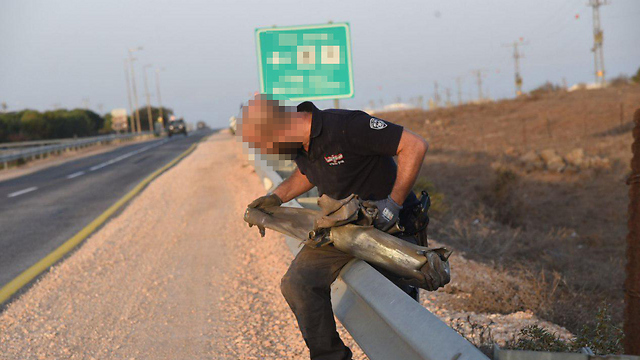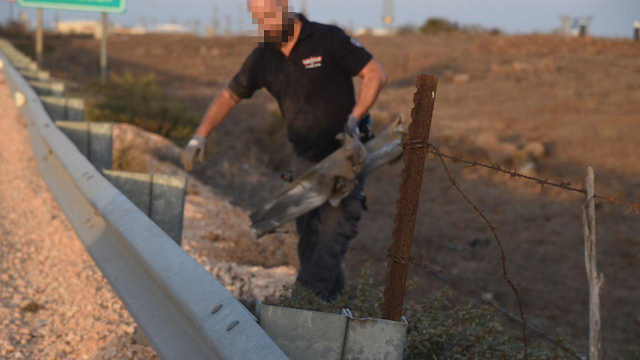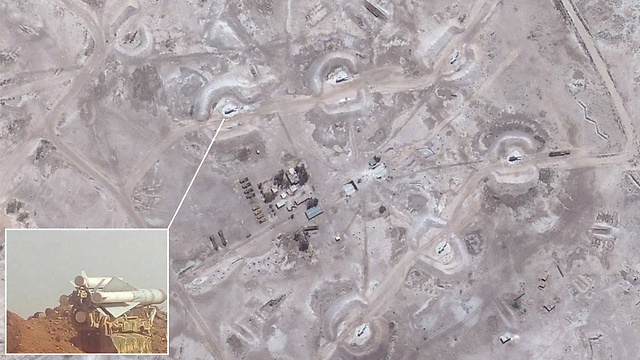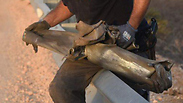

4 errant Syrian rockets land in Israel, IDF retaliates
Internal Syrian conflict again reaches Israel as 5 rockets launched at Israel, 4 found in open areas causing no damage; IDF retaliates by destroying artillery cannons launching rockets within Syrian territory with long-range missiles; should 'spillover' continue, Israeli response will grow harsher, IDF cautions.
The IDF announced five rockets were fired at Israel by Syrian artillery cannons early Saturday, and that it has pinpointed the landings of four of them to open areas in the northern Golan Heights, causing no damage to people or property. The cannons were then destroyed by the IDF in a retaliatory strike.
The IDF added the incident was yet another instance of "spillover" from the internal Syrian conflict.
The initial alarm sounded a little after 5 am in several Golan Heights towns, prompting their denizens to enter shelters. Some 30 minutes after the alarm, residents were allowed to return to their homes.
In retaliation to the errant fire, the IDF attacked three Syrian regime artillery cannons, the IDF Spokesperson's Unit said.
The attack was carried out using precise Spike NLOS (No Line of Sight), or Tamuz, missiles.
The Syrian army issued a statement regarding the IDF shelling, saying it came after "Syrian opposition fighters fired mortar rounds that hit an open area in the Israeli-occupied Golan giving the Jewish state a pretext to bomb the army."
The Syrian army added the shelling caused material damage without saying if there were casualties, and warned against "such aggressive acts", adding it "holds Israel fully responsible for the consequent results".
The IDF, meanwhile, once again cautioned Syria that should these incidents persist—even if they are merely unintentional "spillover"—the Israeli response will grow harsher.

The army's threat of a harsher response was brought about by the growing number of incidents of Syrian rockets landing in Israeli territory.
The recent spate of the "spillover" rockets to hit Israel was an aftereffect of the widespread operation carried out by the army of Syrian President Bashar al-Assad to overtake the Syrian side of the Golan from rebels, with extra effort invested in regaining the border strip with Israel—most of the northern part of which is controlled by former Al-Qaeda affiliate Al-Nusra Front.
The aforementioned rebel forces congregate near the border fence with Israel when fighting is taking place in the region, assuming Assad's army would be apprehensive about launching attacks west, in fear of hitting Israeli land.
The Saturday incident came on the heels of intense fighting heard on the Syrian side of the border Friday, audible in both the Golan and Upper Galilee.
All was not calm on Israel's northern perimeter earlier this week as well, as the IDF attacked a Syrian army post on the outskirts of Quneitra on Thursday afternoon in retaliation for an errant rocket that landed in Israel earlier that day.
"The IDF will not tolerate any attempt to undermine the sovereignty of the State of Israel and the security of its citizens. The IDF views the Syrian regime as responsible to what is happening on the ground," the IDF Spokesman's Office said.
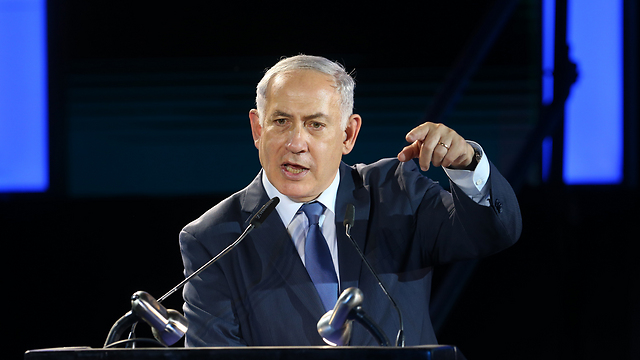
Prime Minister Benjamin Netanyahu commented on the attack during a ceremony marking 50 years of settlement in the Jordan Valley on Thursday evening.
"Our eastern line of defense starts here in this place. And if we were not here, Teheran and Hamastan would be; we will not allow this to happen," he said.
"We see what is happening a short distance north of here, when they take up a position—or try to—over the border. We have a clear policy:
Whoever tries to hurt us, we will hurt them. We will not tolerate 'trickles' and if they attack us, we return fire, and this does not take a lot of time."
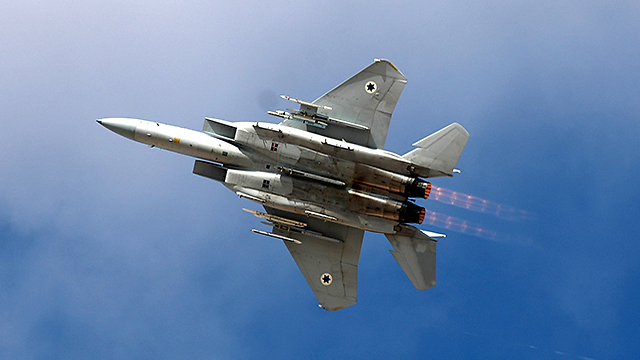
On Wednesday an alarm sounded in IDF bases in the northern Golan Heights due to a rocket fired as part of the Syrian civil war. The rocket landed within Syrian territory near the Israeli border.
Also on Wednesday, an alarm sounded in military bases in the vicinity due to internal shooting within Syria.
Earlier this week, the Syrian army launched an SA-5 anti-aircraft missile at Israeli Air Force planes on a reconnaissance mission over Lebanon. In retaliation, the IAF bombed the SA-5 battery, destroying its fire control radar.
Iranian military Chief of Staff General Mohammad Baqeri said Wednesday the Islamic Republic would not accept Israeli violations in Syria.
"It is not acceptable for the Zionist regime to violate Syria anytime it wants," Baqeri said during a meeting in Damascus with his Syrian counterpart, Ali Abdullah Ayyoub.
The Associated Press and Reuters contributed to this report.














